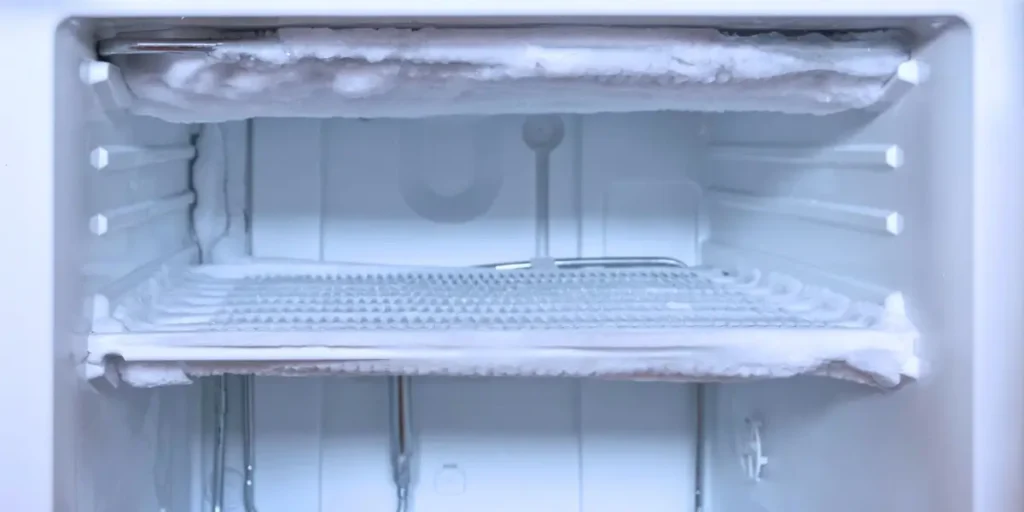Is your Samsung refrigerator giving you chills in all the wrong ways? Have you noticed a recurring issue where your fridge keeps freezing up?
When your fresh produce turns into ice blocks and your beverages turn into slush, it can be frustrating.
This article will explore the reasons behind this perplexing issue and provide you with practical solutions.
We are going to uncover the mystery of why your Samsung refrigerator keeps freezing!
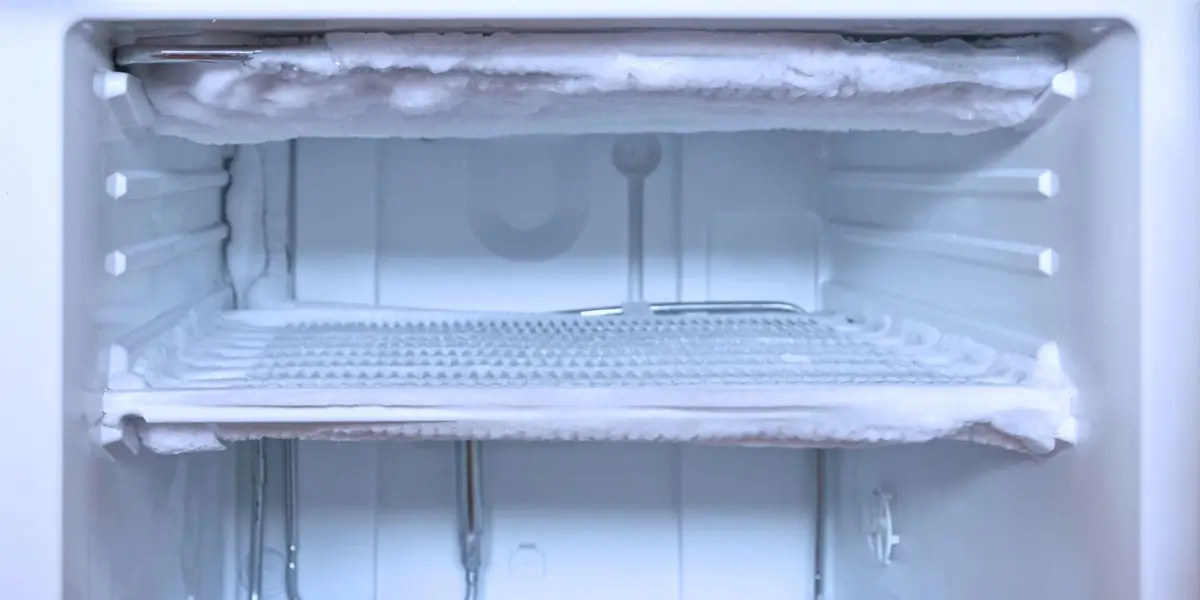
Why Does My Samsung Refrigerator Keep Freezing Up?
If your Samsung refrigerator keeps freezing up, there could be several possible reasons for this issue. Here are a few common causes:
Incorrect Temperature Settings:
When the refrigerator’s cooling system is set too low, the interior will freeze if the temperature is too low.
Temperature settings should be within the recommended range to maintain ideal cooling.
Blocked Air Vents:
Air vents inside the refrigerator allow for proper airflow and circulation. If these vents are obstructed by food items, containers, or ice buildup, the airflow will be restricted.
This can result in uneven cooling and the formation of ice on the cooling coils, leading to freezing.
Faulty Temperature Sensor:
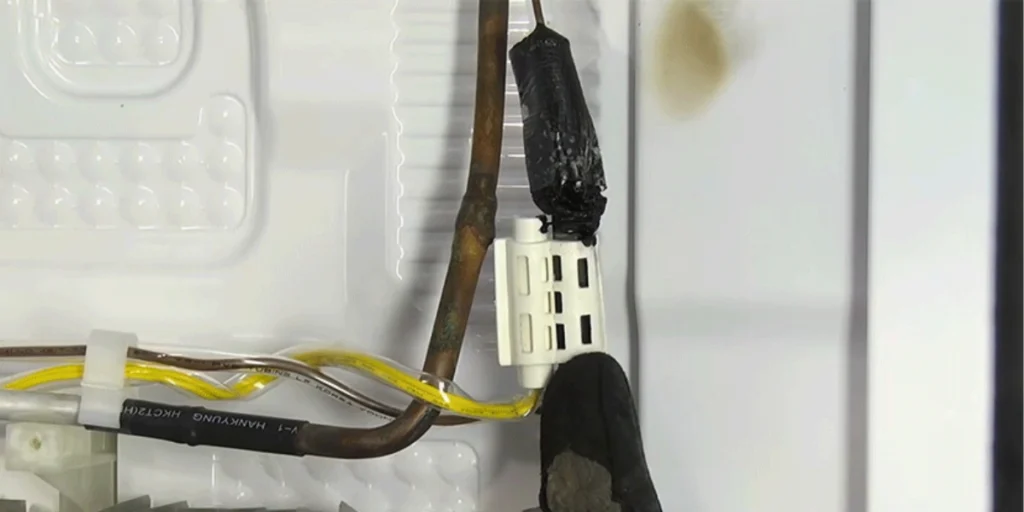
To adjust the cooling cycle, the temperature sensor sends signals to the control board.
In the case of a malfunctioning sensor, the refrigerator may run cooler than necessary and freeze.
Defective Defrost System:
The defrost system is designed to periodically melt any frost or ice that accumulates on the cooling coils.
Failure to initiate the defrost cycle may result from faulty defrost heaters, thermostats, or timers.
This can lead to excessive frost buildup, blocking airflow and causing freezing.
Door Seal Issues:
The door seals, also known as gaskets, create an airtight seal when the refrigerator door is closed.
When seals are damaged or worn out, warm air can enter the refrigerator, disrupting cooling.
The refrigerator compensates by running longer and colder, which can result in freezing.
Overloading:
When the refrigerator is overloaded with food items, it can impede the proper circulation of air inside.
The blocked airflow can cause uneven cooling, with some areas being colder than others. This imbalance can lead to freezing in certain sections of the refrigerator.
Common Causes of Freezing in Samsung Refrigerators
Several common causes can contribute to freezing issues in Samsung refrigerators. Here are some additional details about each cause:
Temperature Settings:
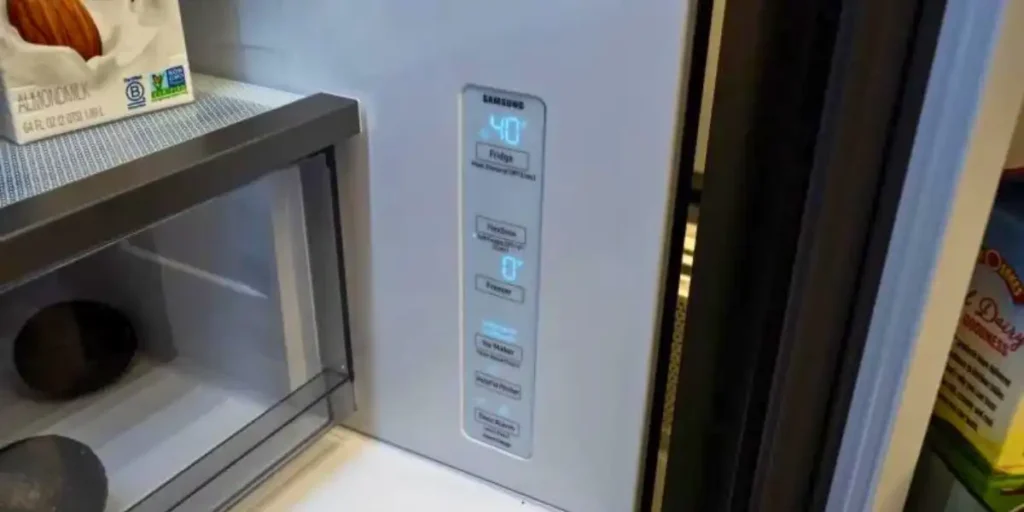
Incorrect temperature settings are a frequent culprit. Too low temperature controls will make the refrigerator run extremely cold, freezing food.
Make sure to set the temperature within the recommended range for the refrigerator compartment (usually between 35 to 38 degrees Fahrenheit or 1 to 3 degrees Celsius).
Airflow Obstructions:
Blocked air vents can disrupt the proper circulation of cold air in the refrigerator.
Ensure that the vents are not obstructed by food items, containers, or ice buildup. Blocked vents restrict airflow, leading to uneven cooling and potential freezing.
Faulty Temperature Sensors:
Temperature sensors play a crucial role in regulating the refrigerator’s cooling cycle. If a temperature sensor malfunctions, it may send inaccurate readings to the control board.
As a result, the refrigerator could run colder than necessary, causing freezing.
Defrost System Issues:
To prevent excessive frost buildup on the evaporator coils, Samsung refrigerators have defrost systems.
The defrost heater, thermostat, or timer can malfunction, accumulating frost and causing freezing.
Damaged Door Seals:
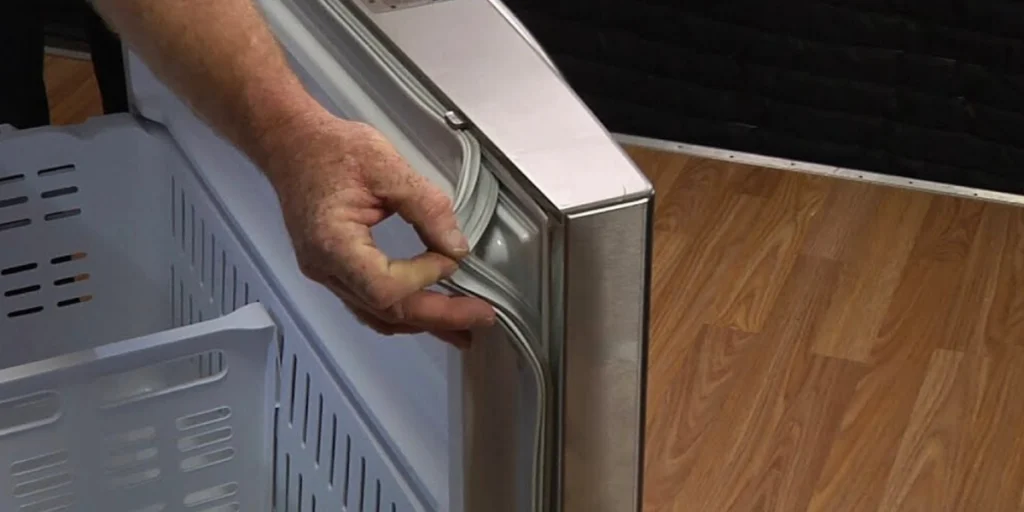
The door seals, also known as gaskets, create an airtight seal when the refrigerator door is closed.
Several factors can contribute to overcooling and freezing in the refrigerator, including damaged seals.
Overloading:
Overloading the refrigerator with a large quantity of items can obstruct proper airflow.
When the airflow is restricted, certain areas of the refrigerator may become colder than intended. It can be resulting in freezing.
Potential Risks and Damages Caused by Freezing
Freezing in a refrigerator can lead to several risks and damages, including:
Food Spoilage:
Freezing can affect the quality and freshness of food stored in the refrigerator.
Some food items, such as fruits, vegetables, and certain dairy products, are more susceptible to freezing.
They lose texture, flavor, and nutritional value when frozen, making them unsuitable for consumption.
Burst Water Lines:
There is a risk of rupture in the water lines or reservoir inside the refrigerator if the lines freeze.
When water freezes, it expands, and this expansion can cause pipes or connections to crack or rupture.
This can result in water leakage, leading to potential water damage in and around the refrigerator.
Damaged Components:
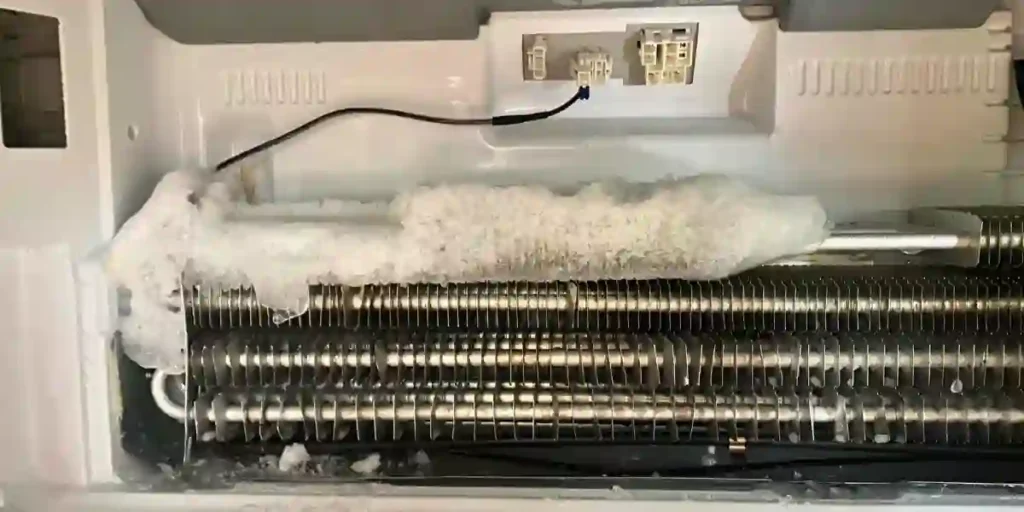
Damage can occur if internal components, such as cooling coils, fans, and sensors, freeze.
Refrigerators suffer from poorly performing cooling coils due to ice buildup on their coils.
Components that are damaged or faulty may need to be repaired or replaced, increasing costs.
Energy Inefficiency:
When a refrigerator freezes up, it often needs to work harder to maintain the desired temperature.
Increased energy consumption is the result of excessive cooling and the presence of ice or frost.
This can lead to higher energy bills and a less energy-efficient operation of the refrigerator.
Malfunctioning Controls:
Freezing can also impact the functionality of temperature controls and sensors within the refrigerator.
The controls may provide inaccurate readings or fail to regulate the temperature properly if affected.
Further cooling issues can occur and optimal storage conditions can be difficult to maintain.
Troubleshooting Steps to Resolve Freezing Issues
These troubleshooting steps will help you resolve freezing problems in your refrigerator:
Check Temperature Settings:
Make sure the refrigerator compartment’s temperature settings are within the recommended range.
If the controls are set too low, adjust them to 35 to 38 degrees Fahrenheit (1 to 3 degrees Celsius).
Clear Air Vents:
Make sure food items, containers, and ice buildup are not blocking the air vents inside the refrigerator. Clear any obstructions to allow proper airflow and circulation.
Examine Door Seals:
Check the door seals for any damage or wear. Damaged seals can allow warm air to enter the refrigerator, causing overcooling and freezing.
If you notice any issues with the seals, consider replacing them.
Defrost the Refrigerator:
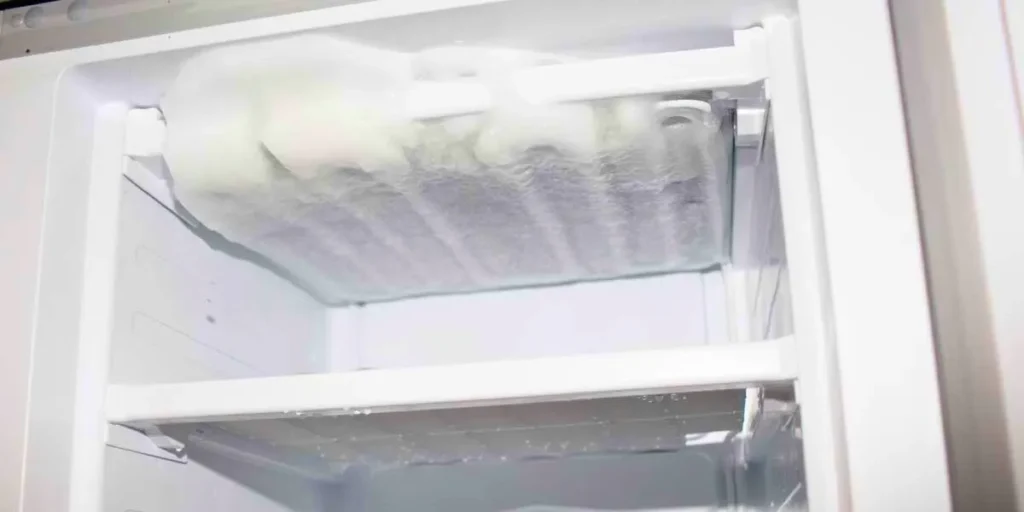
If there is excessive frost or ice buildup on the cooling coils, it can lead to freezing. Unplug the refrigerator and let it thaw completely.
Remove any visible ice or frost manually. Once the defrosting is complete, plug it back in and monitor if the freezing issue persists.
Clean Condenser Coils:
Dust and debris can accumulate on the condenser coils, located at the back or bottom of the refrigerator.
Dirty coils can affect the refrigerator’s cooling efficiency, potentially leading to freezing. Use a vacuum cleaner or coil cleaning brush to clean the coils.
Verify Temperature Sensor Functionality:
If you suspect a faulty temperature sensor, you may need professional assistance. A technician can test the sensor’s accuracy and functionality and replace it if necessary.
Avoid Overloading:
Make sure the refrigerator is not overloaded with items, as this can obstruct proper airflow. Remove any unnecessary or excessive items to allow for better circulation.
Check Defrost System:
It may be that the defrost heater, the defrost thermostat, or the defrost timer aren’t working properly. A professional technician can assess and repair any faulty components.
Preventive Measures to Avoid Freezing in Your Samsung Refrigerator
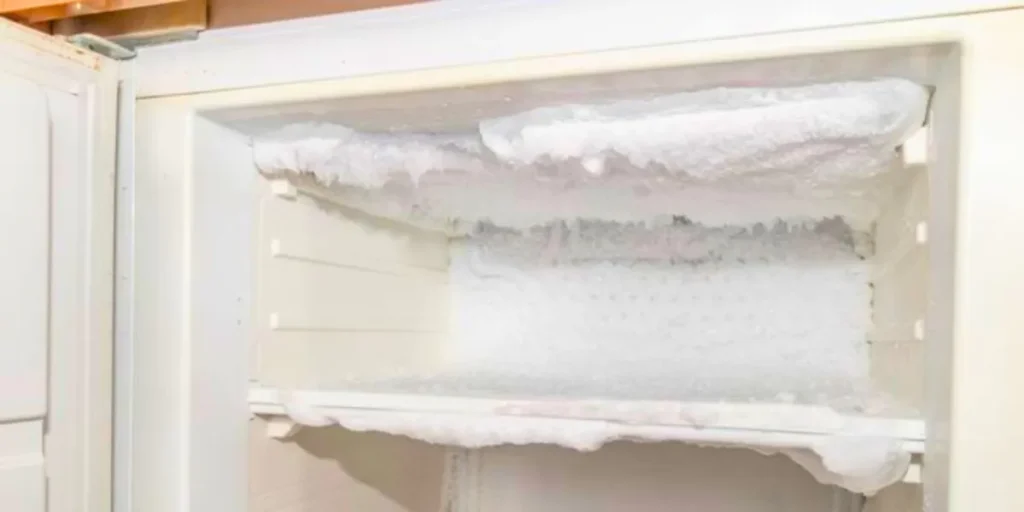
To prevent freezing issues in your Samsung refrigerator, you can take the following preventive measures:
Set the Correct Temperature:
Ensure that the temperature controls are set to the appropriate levels for the refrigerator compartment.
Refer to the manufacturer’s guidelines and aim for a temperature range of 35 to 38 degrees Fahrenheit (1 to 3 degrees Celsius).
Avoid setting the temperature too low, as it can lead to freezing.
Monitor Airflow:
Make sure food items, containers, or ice buildup are not blocking the air vents inside the refrigerator.
Maintain consistent cooling throughout the refrigerator by clearing any obstructions.
Inspect Door Seals:
Periodically examine the door seals for any signs of damage or wear. Damaged seals can allow warm air to enter a refrigerator, causing overcooling and freezing. Clean the seals regularly and replace them if necessary.
Avoid Overloading:
Do not overload the refrigerator with too many items. When a refrigerator is overcrowded, airflow is obstructed, resulting in uneven cooling and freezing. Organize the contents of the refrigerator to allow for efficient airflow.
Regularly Clean Condenser Coils:
Dust and debris can accumulate on the condenser coils at the back or bottom of the refrigerator.
This buildup can impact the refrigerator’s cooling performance and lead to freezing issues.
Clean the coils at least twice a year using a vacuum cleaner or a coil cleaning brush.
Practice Smart Food Storage:
Properly package and store food items to prevent them from freezing. Ensure that containers are tightly sealed, especially liquids or items with high water content.
Place items in appropriate areas of the refrigerator to maintain consistent temperatures.
Avoid Placing Hot Items in the Refrigerator:
Cold items should be placed in the refrigerator after they have cooled to room temperature.
Introducing hot items can disrupt the internal temperature and potentially cause freezing.
Perform Regular Maintenance:
Follow the manufacturer’s recommended maintenance procedures for your Samsung refrigerator.
A cleaning, defrosting, and inspection of various components will ensure optimal performance.
Frequently Asked Questions (FAQs) About Samsung Refrigerator Freezing Issues
What Can Block The Air Vents In My Samsung Refrigerator?
Air vents in your Samsung refrigerator can become blocked by various factors. Place food items or containers in front of vents, which obstructs airflow.
Ice or frost buildup can accumulate on the vents over time, limiting the circulation of cold air. Clearing these obstructions is important to restore proper airflow and prevent freezing.
What Should I Do If My Door Seals Are Damaged?
Samsung refrigerator door seals need to be repaired if damaged or worn. The refrigerator’s airtight seal can be compromised by damaged seals.
This warm air can disrupt the cooling process and contribute to freezing. To resolve the problem, you should replace the damaged door seals promptly.
Is Overloading My Refrigerator A Common Cause Of Freezing?
Yes, overloading your Samsung refrigerator with too many items can contribute to freezing. The refrigerator’s airflow is impeded when it’s overloaded, resulting in uneven cold distribution.
Certain areas may become colder than others, increasing the likelihood of freezing. Organize the contents of your refrigerator and ensure there is ample space for air to circulate.
Conclusion
Don’t let a freezing Samsung refrigerator ruin your food and appliance experience. Check temperature settings, clear air vents, and inspect door seals to prevent this issue.
Avoid overloading and maintain proper airflow for optimal performance. For hassle-free refrigeration, seek professional assistance if the problem persists.
Keep your Samsung refrigerator running smoothly and enjoy fresh, properly chilled food every time.

